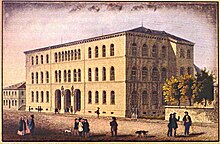University of Karlsruhe
Universität Karlsruhe (TH) | |
 Audimax at Forum | |
| Type | Public |
|---|---|
| Established | October 7, 1825 |
| Rector | Horst Hippler |
Academic staff | 276 |
| Students | 18,245 |
| Address | Universität Karlsruhe (TH) , , , Kaiserstraße 12 76131 Karlsruhe 49°00′34″N 8°24′42″E / 49.00944°N 8.41167°E |
| Website | www.uni-karlsruhe.de |
The University of Karlsruhe, founded in 1825, also is called Universität Karlsruhe (TH), and after 1865 occasionally it has been known as, Fridericiana. It recently merged with Forschungszentrum Karlsruhe to form the new institution, Karlsruhe Institute of Technology (KIT).
It is one of the most prestigious technical universities in Germany located in the city of Karlsruhe, Germany and it is recognized as one of the leading research universities. Its main focus are nature sciences and technological studies, especially mathematics and electrical.
History

The University of Karlsruhe was founded as Polytechnische Schule, a polytechnical school, on October 7, 1825. It was modeled upon the École polytechnique in Paris. In 1865, Grand Duke Frederick I of Baden (German: Friedrich) raised the school to the status of a Hochschule, an "institute or university". Since 1902 The university also has been known as the Fridericiana in his honour.
In 1885 the institution was renamed a Technische Hochschule, Institute of Technology, and in 1967 it became Universität, a full university. In 1899 all technical universities, therefore including the University of Karlsruhe, were granted the right to award doctorate degrees identified as Dr. Ing. for engineering. For honorary degrees, the fields are preceded by h. c., for example, Dr. h. c. Ing. Karl Benz awarded in 1914, who was graduated from the university during his youth.
On April 6, 2006 a contract for the foundation of the Karlsruhe Institute of Technology (KIT) was signed by Professor Horst Hippler and Dr. Dieter Ertmann from the University of Karlsruhe, and Professor Manfred Popp and Assistant Jur. Sigurd Lettow from Forschungszentrum Karlsruhe. The name was selected to emulate the Massachusetts Institute of Technology (MIT), the leading technical university in the United States. [1]
In 2008 a 200 Million Euro donation to the university was made by SAP Co-Founder Hans-Werner Hector.
Admission and education
Previously, the Universität Karlsruhe (TH) was not selective in its admission policies, but in more recent years, several majors have employed a selection process with an effective exclusion grade based upon the number of available openings in relation to applications. Since the winter semester 2007-2008, the Universität Karlsruhe introduced a general selection process for all courses. After the change from a diploma system to awarding bachelor or master degrees, students of all majors are selected by a specific process determining the qualification of the students for the intended topic. [2]
Apart from this program, an attrition process takes place in the early semesters, whereby students failing to pass exams after a specific time or number of tries, drop out of university. Education at Universität Karlsruhe (TH) tends to be theoretically-oriented, requiring a high concentration of mathematical courses.
Comparative rankings
With the exception of the department of biology, [3] this university receives more funding from the Deutsche Forschungsgemeinschaft than any other university specializing in the natural sciences in Germany. [4] However, when compared to Germany's other universites, the university receives average funding. In the engineering sciences (except mechanical engineering where it is in the top10[5]) the university is in the top three together with University of Stuttgart and the RWTH Aachen. However the university is not in the TOP20 in the subject mathematics [6].[citation needed] More than 20% of its students are attracted from other nations and 0.6% of its students receive grants from the German Studienstiftung (German National Academic Foundation). [7] In 1998, ScienceWatch [1] ranked its chemistry faculty as belonging to "the cream of the crop in chemistry" internationally. [8]
Faculties
The university has eleven faculties:
- Mathematics
- Physics
- Chemistry and Biology
- Humanities and Social sciences
- Architecture
- Civil engineering, Geology, and Ecological Sciences
- Mechanical Engineering
- Chemical and Process Engineering
- Electrical engineering and Information Technology
- Computer Science
- Economics
Many departments cooperate, some are shared with the Forschungszentrum Karlsruhe.
Famous people and discoveries
- Ferdinand Redtenbacher (1809-1863), founder of mechanical engineering in Germany
- Karl Benz (1844-1929), the inventor of the automobile, a graduate who also received an honorary Ph.D. in 1914, [2] the honorary doctorate degree awarded to Karl Benz is on display in Ladenburg
- Karl Ferdinand Braun (1850-1918), who developed the cathode ray tube in 1897, which is widely used in televisions, in 1909 he received the Nobel Prize for the invention
- Otto Lehmann (1855-1922), the founder of liquid crystal research
- Heinrich Rudolf Hertz (1857-1894) discovered electromagnetic waves in 1887, which are the basis of radio, and after whom the SI unit of frequency, hertz is named
- Fritz Haber (1868-1934), who developed the high-pressure synthesis of ammonia in 1909 and won a Nobel Prize in Chemistry in 1918
- Wolfgang Gaede (1878-1945), who founded vacuum technology
- Hermann Staudinger (1881-1965), who won a 1953 Nobel Prize in Chemistry for his discoveries in the field of macromolecular chemistry
- Wilhelm Nusselt (1882-1957), the co-founded of technical thermodynamics
- Edward Teller (1908-2003), who is known as the originator of the hydrogen bomb
Famous students
Presidents
- 1968 - 1983 Professor Dr. Ing. h. c. Heinz Draheim
- 1983 - 1994 Professor Dr. h.c. Heinz Kunle
- 1994 - 2002 Professor Dr. Sigmar Wittig
- 2002 - current Professor Dr. sc. tech. Horst Hippler [9]
References
- ^ The strategy for the future
- ^ University of Karlsruhe, Administration: "Eignungsfeststellungsverfahren" (German, accessed on 11/17/2007)
- ^ http://www.dfg.de/ranking/ranking2006/download/dfg_foerderranking_4_3.pdf
- ^ Exzellent in Naturwissenschaften. 03.07.2003
- ^ http://www.dfg.de/ranking/ranking2006/download/dfg_foerderranking_4_10.pdf
- ^ http://www.dfg.de/ranking/ranking2006/download/dfg_foerderranking_4_8.pdf
- ^ Die Eliteschmiede
- ^ ScienceWatch: Chemistry Research. Institutions Ranked by Citations and Citation Impact. July/August 1998
- ^ Office of the President of Universität Fridericiana
